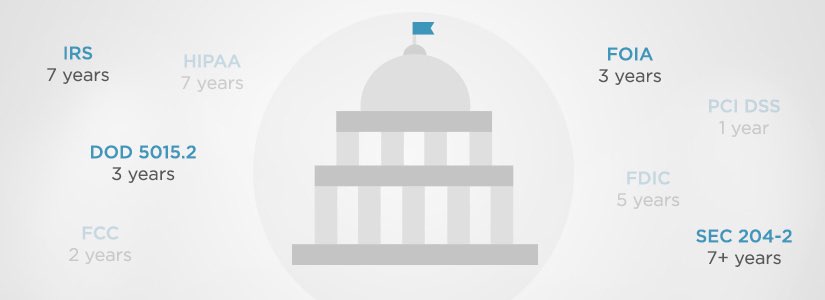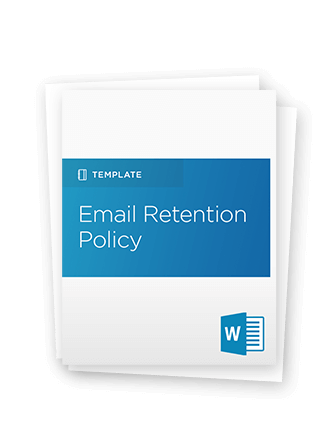Email Archiving Regulations: What Do They Mean for You?

These days, more data flows through email than ever before—far and above the amount of data that flows through physical mail. This is because business is primarily conducted online. It’s faster, smoother, and allows for easier responses from the party you’re trying to contact. Email communication also makes it easier than ever before for your business to save all of the relevant information associated with past dealings and past transactions. Simply archiving your email means that it’s always there, easily accessible if you need it later. Maintaining that email archiving isn’t just convenient, however. It’s also mandated by a set of constantly evolving email archiving regulations.
Want to learn how to choose the right email archiving solution? Download our eBook
What the Law Requires
In 2006, a law was passed mandating data archiving. According to this set of email archiving regulations, your business needs to maintain electronic records. That means that you can’t just delete emails when they are no longer currently relevant; they need to be stored for long-term access. The law requires you to know where that data is stored, to be able to search through it, and to be able to retrieve it on demand. Email archiving isn’t just a convenience, in case you discover that the data would have helped you later; it’s a legal necessity.
The law is also careful to note that simply storing the data isn’t enough. You can’t use a random system, let your emails pile into it, and hope that you never actually have a reason to search through it. Instead, the law notes that you have to know how the system works, be able to use it efficiently, and be able to produce the requested emails quickly. “I don’t know how to get to it” or “It’s not pulling up in a search” isn’t an acceptable excuse anymore.
Penalties for Failing to Follow Federal Email Archiving Laws
If your business doesn’t comply with federal email archiving laws, you might be able to get by with it for quite some time. After all, as long as your business isn’t involved in a lawsuit, you’re safe, right? Unfortunately, you never know when legal issues are going to strike; and inevitably, they appear when you are least prepared for them. The penalties for failing to comply with federal email archiving laws are severe. If you can’t produce the relevant data, you may end up paying “heavy fines.” Not only that, you’ll end up paying the court costs of the other party, face the possibility of contempt of court, and even receive an automatic guilty verdict as a result of your inability to produce the requested information in an efficient and timely manner.
Why is Email Archiving a Law?
Federal email archiving laws are designed to protect both your company and your clients. Often, email communication is of a high level of importance to a legal case. Consider these examples:
Health care: If you’re part of a health care organization, you know that you’re required to adhere to HIPAA regulations. Email communication can be one of the most obvious pieces of information about whether or not a patient’s confidentiality has been breached. Has an employee been discussing privileged health information out of turn? Have patient records been shared in a way that is unsafe? Email archiving means that you have instant access to any communication concerning patient records and can quickly produce any evidence that is needed regarding your involvement.
Contracts and Assurances: Are you bound by contract with the party who has initiated a lawsuit against you? Were the terms of a deal or contract discussed over email? What about your assurances to a client, or a client’s assurances to you? Being able to easily produce the email record of these discussions may be the difference between a lawsuit that is decided in your favor and one that is decided in theirs.
Information Hidden in Your Emails: What information about your clients is contained in your emails? What about former employees? Current employees? Email archiving ensures that you have a record of any communication that has taken place with your office during work hours—and any communication that has taken place with the individuals within it. Email is clear, written evidence that can’t be swept aside or ignored. It’s obvious where it originated, who was responsible for it, and what they had to say. Having this evidence can be of critical importance to some legal investigations.
What About State Email Archiving Laws?
While federal law is very clear about the need for email archiving, individual states can also impose their own laws on your company based on what they feel are the needs of the population. Check into your individual state laws to be sure that you’re compliant with their regulations. In general, you should assume that you need to archive and have access to any email that could be necessary for a future court case. Many state revenue departments, for example, require you to retain data for a minimum of three years. California’s Franchise Tax Board requires a minimum of four years. The IRS, on the other hand, requires a minimum of seven years for their records—the number that is used as the standard for many companies who deal with financial transactions and other sensitive information.
Are There Benefits to the Company That Practices Email Archiving?
Aside from the benefits associated with following the law, there are some other benefits to email archiving. First, by automating the process, you help prevent email from taking up valuable space on your servers. Send emails to the archives on a regular basis, and you’ll free that space up again. It also reduces the load of the mail server, which means that your IT department will have fewer problems running it. Email archiving also helps protect against data loss: it’s simple to recover information from the archives, which means that you won’t have to worry about what’s happened to your company’s emails if the system goes down. Archiving email properly also streamlines your data backup system: because the emails are already properly archived, your backup system doesn’t have to include all the old data every day.
What Should an Email Archiving Policy Include?
You don’t want a vague, non-enforceable policy for dealing with email archiving, particularly if you’re in an industry that is likely to face a need to produce the records for a court case. That means that you should lay the policy out clearly for the benefit of all of your employees. A strong email archiving policy will include:
- Why the policy exists. This includes the federal and state regulations that contribute to your specific policy, as well as any regulations specific to your industry.
- How storage will be divided. How long will each type of email be kept? How will they be divided? Organizing your archiving system makes it easier to determine where relevant information will be stored and to ensure that only emails that no longer legally need to be stored are deleted.
- How the storage will be accomplished. What system will you use? Who is responsible for implementing your solution?
Your email archiving policy can be an extension of your document retention policy, which will make developing it simpler for your company as a whole.
Looking for email archiving that ensures your company is legally complaint with email archiving regulations? Contact us to see what our company can do for yours.

